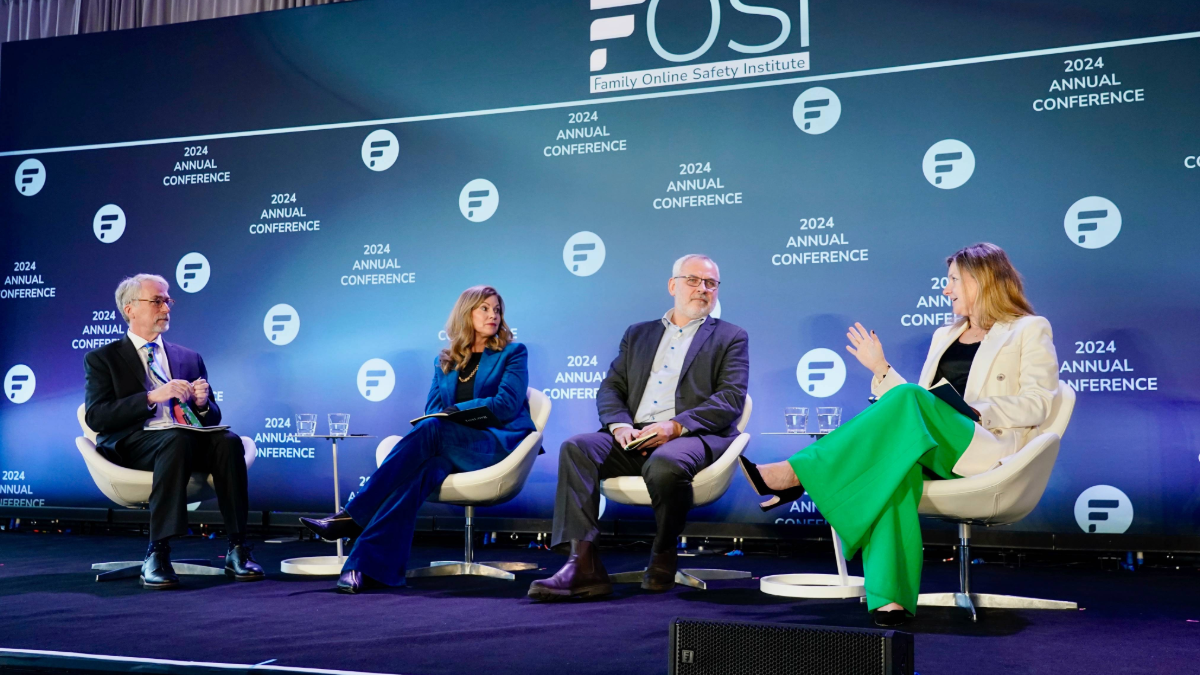Global Online Safety Regulators Network Issues Three-Year Strategic Plan
Justin Hendrix / Dec 10, 2024
Washington DC, December 9, 2025: (left to right) Stephen Balkam, CEO, Family Online Safety Institute (FOSI); Julie Inman Grant, eSafety Commissioner, Australia; Benoît Loutrel, board member, ARCOM; Gill Whitehead, chairperson, Global Online Safety Regulators Network (GOSRN). Courtesy FOSI.
Two years after its launch, yesterday the Global Online Safety Regulators Network (GOSRN) released its strategic plan for 2025-2027, outlining its vision for advancing international cooperation in online safety regulation. GOSRN representatives discussed the plan during a panel discussion at the annual conference of the Family Online Safety Institute (FOSI), which was hosted in Washington, DC.
GOSRN was established in November 2022 with four founding members, and today bills itself as "the first dedicated forum for independent online safety regulators around the world" that enables regulators to "share experience, expertise, and evidence, paving the way for coherent international approaches to online safety regulation."
The network now includes nine member countries: Australia, Ireland, Fiji, France, the Netherlands, the Republic of Korea, Slovakia, South Africa, and the United Kingdom. Taken together, these countries have a combined population approaching that of the United States, making GOSRN a potentially important market bloc to be reckoned with. Eighteen ‘observer’ organizations from six continents include academic, civil society, NGO, and government entities ranging from the National Center for Missing and Exploited Children (NCMEC) and the National Media Commission in Ghana to the NYU Stern Center for Business and Human Rights and the Integrity Institute. FOSI is also an observer.
The GOSRN strategic plan names three main thematic priorities:
- Building regulatory coherence across jurisdictions, which the document says is crucial because online safety "does not stop 'at the border'";
- Contributing to the pool of evidence related to online safety and surfacing best practices, recognizing that "the evidence base for online safety regulation is nascent";
- Facilitating information sharing and coordination to “promote compliance,” which the Network describes as "one of the most valuable parts of our work."
This strategic plan comes at a time when, as noted in the document, "a growing number of countries and regions around the world have introduced and passed online safety legislation," including Australia, Fiji, Ireland, the UK, and the European Union's Digital Services Act, demonstrating the increasing global focus on online safety regulation. The plan emphasizes that "the success of the Global Online Safety Regulators Network depends on our common commitment to develop regulatory coherence across jurisdictions and to promote compliance with rights-respecting online safety regulation."
At the FOSI conference, representative members of the network discussed their progress and goals. Gill Whitehead, the former director of online safety at UK regulator Ofcom and the current GOSRN chairperson, emphasized the necessity of international regulatory alignment to streamline compliance for global firms. “There is so much you can learn from other regulators who have broadly similar powers… the importance of coherence across borders and boundaries is critical,” said Whitehead.
While the GOSRN three-year strategic plan emphasizes information sharing through “regular dialogue,” the importance of “coherent regulatory tools and policies,” and the development of “[r]epositories for members to share non-sensitive information and data related to their online safety regulatory activities,” it says nothing specific about the prospect of joint enforcement activities.
But that could be a possibility down the road. Benoit Loutrel, who chairs French regulator ARCOM’s Supervision of Online Platforms working group, stressed the scalability of the network’s efforts. “If we want to establish a balance of power with industry to induce greater accountability, we have to learn to operate at scale. And you can regulate at scale, and you do that by coordinating.”
During the discussion, the panel addressed Australia’s recent move to introduce age-restriction policies for social media. Australia eSafety Commissioner Julie Inman Grant described it as a complicated challenge for a regulator.
“I've become an anxious regulator whose job has totally been rewired,” she said, indicating there is still a lot of work for her office to do before the law can be implemented. “It's not really a social media ban. I look at it as a social media restriction bill. And because everything is so vague, the power or the task will be given to me, working with my minister, to figure out how this works. So my commitment to the industry and the mental health advocates and the youth and the academics is that consultation is going to be our first plan of action.”
The UK’s Whitehead raised concerns about AI and its impact on children’s safety, urging greater alignment between AI safety and online safety initiatives. “We are seeing the harms of AI in children’s lives today… there is so much we can learn from each other,” she said.
The role of encrypted spaces and the challenge of monitoring harmful content, especially child abuse material, were focal points of the discussion. Inman Grant stressed the balance between privacy and accountability. “There are no expectations that any company would break or weaken encryption, but that doesn’t absolve them of responsibility either,” she said, highlighting innovations such as on-device nudity detection and homomorphic encryption as potential solutions. “We're watching where the science and the technology is going in terms of secure enclaves, behavioral signals that other end-to-end encrypted services like WhatsApp are picking up through profile photos and non-encrypted parts of the service.”
France’s Loutrel called for industry-wide interoperability to empower users and improve digital safety. “We need the big tech companies to come together with civil society and regulators… at some point, we need an initiative,” he said. Loutrel noted the importance of breaking down silos between tech giants to foster user empowerment and better safety practices.
As the panel concluded, the panelists reflected on their aspirations for the future. Australia’s Inman Grant expressed hope for safety-first and safety-by-design frameworks in emerging technologies. “Rather than waiting for others to clean up, embed safety protections. The detritus is our citizens if this is deployed recklessly,” she said.
Related Reading
Authors
